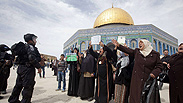
'Extreme leftists aren't alarmed by a non-Jewish majority among the united state's citizens'
צילום: AFP
Isratine? No, we must part
Op-ed: How can one imagine a bi-national state in a world where even Czechs and Slovaks cannot bind themselves to one authority?
This appears to be a critical time, which will determine whether the two people living in this land will continue twisting around each other like wrestlers who are afraid to lose grip, or will let go and drift apart.
An overwhelming majority among the Jews and Arabs is hoping for the second option, but does not believe it has a chance of being fulfilled. The leaders have accepted the failure and are busy planning their moves following the crisis which will surely break out as a result. Their top priority is framing the other side in the world's public opinion.
On the backdrop of the desperation over the possibility of dividing our few miles, the voice of those supporting the establishment of one state from the sea to the Jordan River is growing. This idea is shared by extremists from the Right and Left.
Among the rightists, there are those who believe that the occupied territories should be annexed and that their Arab residents should be given full civil rights. In their opinion, this move does not undermine the Jewish state vision, as the demographic trend contradicts the forecast of the establishment's demographers. The number of Palestinians is much lower than the acceptable figures say, their birthrate is dropping, and the emigration from Israel persists.
They, Zion's complacent, are certain that we are about to receive masses of Jews who will flee the soaring anti-Semitism in Western countries and will be attracted to the thriving Israel. And so the Jewish majority will grow, democracy will be preserved, and the Arabs will get accustomed to their status as an ethnic minority which is happy with its lot and participates in the construction of a state with a Jewish majority and Jewish cultural climate.
This opinion is shared by a small minority, mainly veteran revisionists like Moshe Arens and Rubi Rivlin. They think that their teacher, Ze'ev Jabotinsky, had he still been living among us, would not have changed a word in his papers. There are also naïve idealists, mainly among national religious camp members, who believe that the course of Jewish history is determinist and that they know its process.
Compared to them, most annexation supporters are not at all naïve. They raise the banner for the establishment of Bantustans: Tiny, disconnected regions, whose Palestinian residents will get the right to decide how high property tax should be in their communities, to employ inspectors and to run the fire brigade station. Until when? Until the messiah arrives or until the Jews get the chance to organize a mass deportation, whatever happens first.
In the leftist extreme we find those who don't believe in the option of separation, can't find a way to settle democratic existence with annexation, and are not alarmed by the possibility that the majority of the united state's citizens will be non-Jews. As far as they are concerned, the burden of the occupation overpowers any other consideration, and therefore it is better to establish a multinational republic with one citizenship. If the enterprise succeeds, it will take just a few generations for the two communities to dissolve into each other, creating a fascinating culture, a hybrid of Jewishness and Arabness.
Many Arabs hold this opinion. The good ones assume that in the joint state the Jews will turn into a useful and submissive minority. There are few Jews in favor of it, and the loudest one among them is Gideon Levy, Haaretz's diligent and talented political journalist. His motives are noble, but his pangs of conscience are similar to physical pain which motivates a person to throw himself off the roof. A smashed body does not suffer.
Since the fall of the Roman Empire until the establishment of the European community, there have been about 1,500 years of wars between the continent's nations. Only the establishment of the democratic regimes and transcontinental economic prosperity made the staggering union possible. How can one think about an "Isratine" republic in a world where even Czechs and Slovaks cannot bind themselves to one authority?
Levy and those who share his opinion forgive the Arabs for their complete failure in adopting modern values and are willing to share the rule with them and even take into account a possibility, derived from the manners of the democratic regime, that they will be in power. Have the Palestinians gotten rid of the poor culture characterizing their 350 million Arab brothers? Perhaps, but I'm not willing to test it on my own body.










